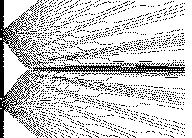 Mathematical Physics
Mathematical Physics
 Mathematical Physics
Mathematical Physics
No attempt will be made here to explain what mathematical physics is about. There is no general agreement even among the experts. Moreover, this field of research is regarded as somewhat dubious by many physicists. However, the following words of Maxwell are right on target:
J.C. MAXWELL
On Faraday's lines of force
 Foundations of Quantum Mechanics
Foundations of Quantum MechanicsNobody has explained why we should worry about the foundations of quantum mechanics better than John Bell:
J.S. BELL
Speakable and Unspeakable in Quantum Mechanics
The first charge against "measurement", in the fundamental axioms of quantum mechanics, is that it anchors the shifty split of the world into "system" and "apparatus". A second charge is that the word comes loaded with meaning from everyday life, meaning which is entirely inappropriate in the quantum context. When it is said that something is "measured" it is difficult not to think of the result as referring to some preexisting property of the object in question. This is to disregard Bohr's insistence that in quantum phenomena the apparatus as well as the system is essentially involved. If it were not so, how could we understand, for example, that "measurement" of a component of "angular momentum" ... in an arbitrarily chosen direction ... yields one of a discrete set of values? When one forgets the role of the apparatus, as the word "measurement" makes all too likely, one despairs of ordinary logic ... hence "quantum logic". When one remembers the role of the apparatus, ordinary logic is just fine.
In other contexts, physicists have been able to take words from ordinary language and use them as technical terms with no great harm done. Take for example the "strangeness", "charm", and "beauty" of elementary particle physics. No one is taken in by this "baby talk". ... Would that it were so with "measurement". But in fact the word has had such a damaging effect on the discussion, that I think it should now be banned altogether in quantum mechanics.
J.S. BELL
Against "Measurement"
 Bohmian Mechanics
Bohmian Mechanics

 Bohmian mechanics is the most
naively obvious embedding imaginable of Schrödinger's equation into a
completely coherent physical theory. It describes a world in which
particles move in a highly non-Newtonian sort of way, one which may at
first appear to have little to do with the spectrum of predictions of
quantum mechanics. However, this deterministic theory of particles in
motion completely accounts for all the phenomena of nonrelativistic quantum
mechanics, from spectral lines to interference effects, and it does so in a
completely ordinary manner. It was first presented in 1927 by Louis de
Broglie, just after the inception of quantum mechanics itself. It was soon
abandoned and utterly ignored until rediscovered a quarter century later by
David Bohm, who showed how it resolved the measurement problem and
accounted for the reduction of the wave packet. Its principal advocate for
the past three decades was John Bell:
Bohmian mechanics is the most
naively obvious embedding imaginable of Schrödinger's equation into a
completely coherent physical theory. It describes a world in which
particles move in a highly non-Newtonian sort of way, one which may at
first appear to have little to do with the spectrum of predictions of
quantum mechanics. However, this deterministic theory of particles in
motion completely accounts for all the phenomena of nonrelativistic quantum
mechanics, from spectral lines to interference effects, and it does so in a
completely ordinary manner. It was first presented in 1927 by Louis de
Broglie, just after the inception of quantum mechanics itself. It was soon
abandoned and utterly ignored until rediscovered a quarter century later by
David Bohm, who showed how it resolved the measurement problem and
accounted for the reduction of the wave packet. Its principal advocate for
the past three decades was John Bell:
 Is it not
clear from the smallness of the scintillation on the screen that we have to
do with a particle? And is it not clear, from the diffraction and
interference patterns, that the motion of the particle is directed by a
wave? De Broglie showed in detail how the motion of a
particle, passing through just one of two holes in screen, could be
influenced by waves propagating through both holes. And so influenced that
the particle does not go where the waves cancel out, but is attracted to
where they cooperate. This idea seems to me so natural and simple, to
resolve the wave-particle dilemma in such a clear and ordinary way, that it
is a great mystery to me that it was so generally ignored.
Is it not
clear from the smallness of the scintillation on the screen that we have to
do with a particle? And is it not clear, from the diffraction and
interference patterns, that the motion of the particle is directed by a
wave? De Broglie showed in detail how the motion of a
particle, passing through just one of two holes in screen, could be
influenced by waves propagating through both holes. And so influenced that
the particle does not go where the waves cancel out, but is attracted to
where they cooperate. This idea seems to me so natural and simple, to
resolve the wave-particle dilemma in such a clear and ordinary way, that it
is a great mystery to me that it was so generally ignored.
J.S. BELL
Speakable and Unspeakable in Quantum Mechanics
J.S. BELL
Speakable and Unspeakable in Quantum Mechanics
For a little more on Bohmian mechanics click here; for more detail, click here.
*The picture of the two-slit interference patterm is courtesy of Martin Daumer*

